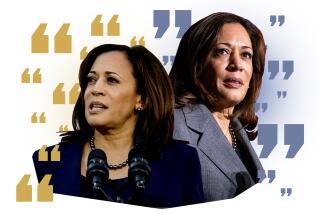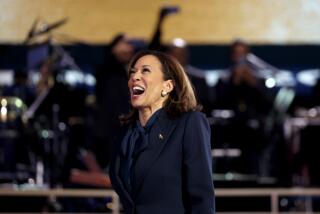Hillary Clinton Negotiates Turns Along Campaign Trail : Politics: Democratic nominee’s wife has gotten much attention, good and bad. Criticism recently has subsided as she focuses on children’s issues.
- Share via
WASHINGTON — In this political “Year of the Woman,” no woman running for office has gotten as much attention as one who is not: Hillary Clinton.
For her, the political year has gone through at least four phases. At first, there was Hillary the Secret Weapon--the gutsy, dedicated fighter for the interests of women and children. In the hopes of Clinton aides, she would attract the support of liberals and feminists to the cause of her moderately conservative Southern husband.
Then there was Hillary the Savior, who appeared at her husband’s side when Gennifer Flowers’ accusations focused public attention on rumors of his infidelities.
Next, inevitably, came Hillary the Problem. For months--from the unguarded moment in March when she talked to a dozen glaring television cameras about how she had not “stayed home and baked cookies and had teas” to the frenzy of Hillary-bashing at the Republican National Convention in August--Democratic strategists worried, and Republican tacticians hoped, that Hillary Clinton would become a major liability.
But now, as she travels the country with a small group of aides, campaigning in 25 cities in the last two weeks, the signs are clear that a new phase of the campaign has begun.
While Mrs. Clinton may never garner the sort of warm and cuddly feelings the public gives to Barbara Bush, Democratic officials say their recent polls show her with a more favorable image than Barbara’s husband, the President, or for that matter, former President Ronald Reagan.
Most telling of all, Republicans--stung by a backlash from their convention--have almost completely dropped references to Hillary Clinton from their speeches.
And to Mrs. Clinton, at least, that comes as no surprise. “Whatever the rules of the game are, I can figure them out,” she said in a recent interview.
Hillary Clinton does appear to have figured out the campaign game. In her appearances, she now displays the discipline and focus that she lacked in the campaign’s springtime of discontent. But still ahead of her, should her husband win next month’s election, will be a more difficult game--mastering the role of being a First Lady with an open and strong interest in policy and government operations.
Part of the skill of mastering both the campaign role and a possible future role within a Clinton Administration involves focusing on her longtime interest in issues involving children. The campaign has presented her to the public recently in a series of forums at hospitals, child care centers and schools that allow her to talk about her policy ideas in a setting that relatively few voters are likely to find upsetting.
And Hillary Clinton repeatedly tells interviewers that she would like to concentrate on the same sorts of issues should her husband win the election. “I want to be a voice for children in the White House,” she says.
On a recent campaign morning, Mrs. Clinton repeatedly conveyed that message as she briskly dispatched 10 satellite television interviews in a row, incessantly driving home both her own theme and the campaign’s overall attack on President Bush.
Voters “want an election about the future,” she told an anchorman in Milwaukee. Unfortunately, the Bush campaign wants to “divert attention from the real issues of the campaign” with negative tactics.
A few minutes later, it was time for Quincy, Ill. The Republicans “are trying to divert attention from the real issues. . . . Most people want this election to be about them and their future.”
Then, on to Louisville, Ky.: The GOP “has a negative political strategy to distract people from the real issues.”
That sort of focus not only conveys the campaign’s message, but also helps guard against the sort of stray remarks that can strike a sour note with voters. And judging by the polls, that caution appears to have succeeded so far.
To be sure, Hillary Clinton’s negative image persists with many voters. Pollsters say her presence in the political arena has tended to increase an existing polarization that divides voters by age, by gender and by their views on the proper roles of women in American society.
On the one side are people like those who pressed forward against rope lines to shake hands with her after a recent speech at the University of Colorado in Boulder, displaying an enthusiasm that many candidates--let alone spouses--seldom see. Particularly to many of the women in the mostly youthful crowd, Hillary Clinton was a role model.
Another example came at a recent fund-raiser in Boston, where an outpouring of supporters--again mostly women--brought in more than $500,000, a staggering figure for a candidate’s spouse.
As she was at the beginning of the campaign, Hillary Clinton has once again become a rallying point for many voters, including many liberal Democrats, who might otherwise be cool to her husband.
“You’re an inspiration to all of us,” one of the young women in Boulder told her.
Teresa Sharp represents the other side. Interviewed recently in her home in Dayton, Ohio, the 36-year-old mother of two, whose husband works two jobs while she stays home with their children, spoke bitterly of Hillary Clinton, mimicking her voice as she recalled the “tea and cookies” remark. “If you look at Bush and his wife--she stayed home,” Sharp said admiringly.
Hillary Clinton concedes that some of her problems with voters like Sharp are of her own making. “I didn’t know--have experience in this before. How could you until you’ve done it?” she asks.
“I didn’t understand either how nobody could be expected to have any context to put me or Bill in because we came out of nowhere. And it’s a process of getting to know someone,” she added. “It’s a process that takes longer, and that’s something that I recognize and have really tried to understand.”
More to Read
Get the L.A. Times Politics newsletter
Deeply reported insights into legislation, politics and policy from Sacramento, Washington and beyond. In your inbox twice per week.
You may occasionally receive promotional content from the Los Angeles Times.











